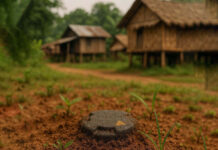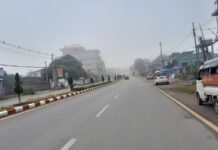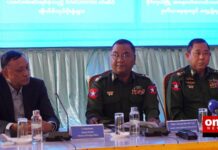(26-29 November 2017)
The greatest bankruptcy in life is hopelessness.
Attributed to The Buddha
This time, my main purpose was to take part in the Sino-Myanmar Scholars Informal Meeting, which was on 27 November.
This is the second such meeting that I have the honor to attend. The first was on 6 April 2017, that I have already reported in To Hopeland and Back: The 29th trip
As usual, I’ll reporting what was discussed there without naming who was saying what.

Day One. Sunday, 26 November 2017
A peace achieved through violence can only be sustained by violence.
Bangkok Post, 29 August 2017
On my arrival in Mingladon, I meet a friend who is helping Naypyitaw in the peace process. She wants to know the latest update from the EAOs. The following is the abstract from our 30-minute meeting:
- I have been told that the government side has rejected the EAOs proposal to discuss the SSR (Security Sector Reform), insisting that it will only negotiate on the DDR (Disarmament, Demobilization, and Reintegration) issue. This is despite the fact that one of the NCA’s 36 decisions is the definition of the “Security Sector Reintegration” which is to be negotiated during (sub) national dialogue. It says: Security Sector Reintegration means the SSR-DDR procedures.
- I have been also informed by experts that going flat out on the DDR won’t work for the following reasons:
- It will force the EAOs to feel defeated, that it has become a win-lose solution, and not a win-win one as they had expected in the first place
- The bulk of the fighters will, as a result, move to other EAOs that have yet to sign the NCA
- We have already seen this before:
When the PSLA was disarmed in 2005, the TNLA arose. And when the SSA was forced to become a PMF (People’s Militia Force), its fighters moved over to the First Brigade that refused to go along.
- DDR is also against the Tatmadaw’s own policies declared in its 2015 White Paper, which calls for establishment of PMFs and BGFs (Border Guard Forces) to assist in deferse of the country
She tells me DDR isn’t her group’s idea. And we part friends.
The rest of the day is spent visiting relatives and then receiving them at Parami, the hotel that I stay.

Day Two. Monday, 27 November 2017
At a time when the US and Europe flirt with concepts of humanitarian intervention and democratic promotion, China has proclaimed itself as a staunch defender of national sovereignt y and sovereign freedom from external intervention.
Stratfor, 27 June 2016
The meeting is held at Dagon Room#2, 2nd Floor of the Sedona Hotel, which is not far from Parami.
There are 18 of us sitting round a round table: 5 from HD, 7 from China’s Yunnan, and 6 from the Myanmar side. You might say that I’m the only black sheep there, not being a scholar.
After the customary introductions, Adam Cooper, HD’s country representative, informs the participants that the meeting is being held under Chatham House Rule, against the backdrop of Tatmadaw chief visiting China, 21-25 November, and the State Counselor’s trip, 30 November.
Then come the discussions, the summary of which is as follows:
China#1
- China does not want to see a chaotic Myanmar
- Yunnan’s opening and development depends on Myanmar
- Rakhine crisis, which China considers Myanmar’s internal affair, has intensified from internal to bilateral, then regional and global issue. China is closely following upcoming elections in Malaysia and Bangladesh, where Muslim radicals might increase their seats in their parliaments.
- China has good relations with both Bangladesh and Myanmar. The Bangladeshi governments, so far, have been made up of moderates, creating a space for cooperation. Hindus and Buddhists there can coexist peacefully with the majority Muslims.
- Kofi Annan’s recommendations, we think, are in the right direction
Myanmar #1
On Saturday, 25 November, I was at a panel discussion, where ex-military officers attended. According to one of them, they don’t accept Annan’s report. They don’t trust Bangladesh. They are also worried about repatriation of the refugees back to the country. The tone was clearly “us and them”, and that was frightening.
They are also against BCIM (Bangladesh-China-India-Myanmar) economic corridor. “It’s foolish to implement it at a time of conflict, said the panelist. On the other hand, they don’t trust the US and the Western media either.
Myanmar#2
- Security is priority in Myanmar
- Perhaps we can adopt standard rules that are in place in democratic countries. For instance, a citizen must be able to speak and write the official language. That polygamy (having more than one wife) is banned, etc.
China #2
- Citizenship for the refugees will be a long and complex issue. Bangladesh doesn’t regard them as its own people either. It will take a long time to identify citizens as few carry valid documents to prove themselves. Under the present framework, the matter can never be resolved.
- Perhaps dealing with poverty will be an appropriate first step. Other changes, after success in this step, may follow.
Myanmar#3
- Avoid blaming. Avoid making someone look bad.
- The issue is deeper than about identity and poverty.
China#3
- The major issue is the peace process
- Poverty eradication is a method for reducing tension.
- Mongla is successful pilot project. With our help, poverty has been eradicated. UN also agreed it was a good example of development without international aid.
Myanmar#4
- Trust deficit is another issue. Public sentiment on China is deep-rooted, especially on Chinese business firms
- 100,000 IDPs along the border are without adequate support
- We encourage China to redeem its image
China#3
- The difference between Beijing and Yunnan is in the focus of each:
Beijing – security focus
Yunnan – economy focus
- China encouraging FPNCC to sign the NCA
Myanmar#5
- Because of Rakhine issue, there is some positive change of sentiment for China
- Most China-initiated projects don’t benefit the people. Benefit sharing therefore should be considered
- We talk about poverty to be eradicated by development projects. But we should not forget that development projects can also bring conflicts into the project areas
China#3
I have limited knowledge of Kachin. But when I visited there, I heard local opinions about the Myitsone dam. I then wrote a report that with such public emotions, it would be ill-advised to build the dam. But companies there just ignored my advice.
China#1
- Allowing INGOs to operate along the border might constitute interference in internal affairs, except for some special cases like widespread infectious disease
- System in China is top-down. Most policies are controlled by central government. Yunnan has little room to maneuver.
- Many believe China is the boss behind the scene. But we don’t think that Wa demand for a separate statehood is possible
HD#1
Perhaps we can take a leaf from how the South China Sea issue is being tackled.
They avoid hard questions like: Which island belongs to whom? Instead they focus on individual issues like joint fishery and resource management. They try to build confidence that way.
Khuensai
6 stories from history (presented here in a separate file)
Myanmar #2
- Many who masqueraded as Rohingyas were interrogated after their arrival in Thailand, and they could not tell their addresses in Rakhine
- China should see that, unlike the 1988-2011 period, Myanmar is exposed to the rest of the world. Or it be may be lost in the Dark Age again.
Myanmar#1
After 2008, civil society organizations (CSOs) started to take precedence over the political parties. They should ideally work together. But parties still don’t seem to trust the CSOs enough.
China#3
- Would like to discuss with you (Khuensai) on your conclusions
- We will need something like a Joint Center for Peace and Development between China and Myanmar in order to move further
- Trust between Tatmadaw and EAOs most important. They are refusing to sign the NCA, no matter how China urges them to, because they don’t trust the Tatmadaw. To win their trust, the first thing to do is to stop attacking them
- Peace first, then (dealing with) drugs. Peace must come first.
- It is not in Myanmar’s interest to rely solely on China. China also doesn’t want Myanmar to be isolated. A blockaded Myanmar doesn’t benefit China.
Myanmar#3
We may need to develop the non-signatories on board. What they are doing today is just window-dressing.
China#3
Trust was lost after the fighting in Kokang in 2015. That is why they have drafted their own NCA.
They refuse to sign while there is fighting.
HD
There is a chicken-and egg situation, because the Tatmadaw is saying if you want me to stop the fighting, sign the NCA.
Myanmar#5
The timing is not right yet for mega economic projects. People may think, “Now China has done it again!” Economic development is important but we need to have an economic strategy first.
Adam Cooper (Closing remarks)
We appear to have focused on 7 themes:
- China involvement important. The question is how we do it.
- Need to strike a balance in the current hot issues. For example, Rakhine and Northern Alliance
- Cooperation with the international community
- Institutional capacity on the Myanmar side
- Civil-military relations
- Cooperation between China and Myanmar. At which level?
- Interim steps. Beginning with less sensitive issues which are narrower in scope first.
At 13:05 we wind up and have lunch together. At 14:00, we part with our Chinese friends, who return upstairs to meet with UN and other diplomats.
At 17:00, I’m receiving friends coming far and near. Here are the excerpts from my notes taken there:
- Al Jazeera is guilty of adding a new race to the world. Look at the censuses taken by the British. There wasn’t any mention of Rohingya.
- Bangladesh is roughly the same size as Shan State. But it has an explosion of population. The result is the Rakhine crisis.
Shan State Bangladesh
Area: 60,155 miles2 56,977 miles2
(155,801 Km2) (142,776 Km2)
Population: 5.8 million 163 million
(I ask them whether they have got hold of plans by the Muslims to take over the country. All of them give me a blank look: something like, “Khuensai, go home.”)
- I don’t believe China can’t control the Wa. If Thailand’s border closure had forced Khun Sa to surrender (in 1996), why can’t China do the same to the Wa?
Something to sleep over, isn’t it? So we break up the party 3 hours later.

Day Three. Tuesday, 28 November 2017
Comanche Chief: You ask me to be better than my enemies?
Negotiator: I ask you to be greater. A great man grants great favors.
Comanche (1956)
Today, I visit Pyidaungsu In stitute-Yangon office (PIY), who are working on 5 research papers to be published as booklets, in 2018
Later, I visit the NCAS.EAO office that was opened on 18 November. It is just next door to the NRPC office and the Union Election Committee (UEC) Information office. I only stay there for some 10 minutes as most of the staff are busy accommodating an EAO8 meeting.
According to a Shan representative who had attended the 6th JICM in Naypyitaw yesterday, the Restoration Council of Shan State (RCSS) had accepted the government’s proposal to hold the (sub) national dialogue in Langkher/Langkho for 3 reasons:
- If it continues refusing to hold NDs at it did the last time, it will have to either boycott the next Panglong 21, or just attend it as observers. And the result would be quite as empty as the last time
- Langkher, though a district capital, is still a small town, and have few accommodations. However, if the RCSS can hold decisive pre-ND meetings in bigger cities like Taunggyi, Lashio and Kengtung, there will be need for only a few hundred representatives to hold the ND in Langkher
- The compromise may serve as part of the trust-building process from which to rebuild the relationship with the government and Tatmadaw
I have nothing against it, i inform the young friend. But I warn him he’s going to have a tough time explaining himself to other member organizations of the Committee for Shan State Unity (CSSU).
In the evening, I have another session with my relatives, 19:30-22:20.
Nothing much to report here, except I find out that I’m still lucky to be alive after 69. My mother passed away in 1990 at the age of 63, and my father followed her in 1993. He was 68.

Day Four. Wednesday, 29 November 2017
One who experiences the unity of life
Sees others in oneself
Sees oneself in others
And looks at everything with an impartial eye.
Siddhartha Gotama, aka The Buddha
I have breakfast with friends who are holding a Joint Monitoring Committee (JMC) Review meeting at the same hotel.
Things were not so good during President Thein Sein’s time. But now they have become tougher, they said.
“We used to have informal meetings then. So if we had any complaints, we could meet and straighten them out in an informal way. But now, we only send written official complaints to each other. Naturally, it has become more complicated to deal with them.”
According to 7 Day, quoting Dr Suikhar, the JMC-U secretary, it has received 285 complaints during the past 2 years. Out of which 182 were settled. Over 120 complaints were from Shan State.
At 13:30 we are in the air. An hour later, we land in one piece at Chiangmai.
[flipbook pdf=”http://english.panglong.org/wp-content/uploads/2017/12/China-Myanmar-Scholars-Informal-Meeting.pdf”]












Leave a Comments